- Home
- Ralph Peters
Shadows of Glory Page 6
Shadows of Glory Read online
Page 6
When I looked again, Kildare was gone. Around the table, all other eyes were closed. Now I am not one to spoil a bit of fun, if it be decent. But there was something in the matter I still could not like. I had grown awfully tired, though, and found myself resigned to sit and let things pass to the flicker of the lamp. I would have preferred to lie abed, to sink into dreams. The whole weight of the day, of my long sickness, settled upon me.
I closed my eyes again, in case they looked. For none of us wants blame for disappointments. I felt something delicious now, almost a swoon. I seemed to be sinking, and watching myself as I sank.
Twas then I felt the cold. I thought Kildare had raised a window.
The cold flowed from the girl’s hand.
Her grip strengthened, becoming as hard as a man’s.
I had never felt a hand so chilled. I feared she was ill, or in a seizure. I thought I must cry out. And yet I only flowed along. As if we were all flowing together. But there was a restlessness, a struggle, somewhere under the calm.
Her soft voice stilled me.
“She comes . . .” the girl said, “ . . . she . . . comes, the tawny one . . . fair as a princess . . .”
I popped my eyes open. Fearing some imposture by Kildare. But I saw nothing. Only earnest faces, dimly lit. And my eyes hated the least light. Darkness they wanted. Rest.
That cold hand.
“ . . . she’s with us now . . . she’s been waiting . . . waiting so long . . .”
Her grip grew so strong it hurt me.
“ . . . she brings a message . . . for the little man . . .”
Hand cold as a tomb. And the lush, falling darkness all around me.
The girl began to sing. Wordlessly. Softly. Beautifully. A whisper of a melody.
Twas a cradle song I knew. From old Lahore.
And so I learned fear. I do not like to think myself a coward. But I could not move. I could hardly breathe. I sensed danger, as a veteran soldier will at the edge of an ambush.
Then she crushed me.
The next voice that come out was not her own, but one I knew.
“Beloved . . . oh, Beloved of Allah . . . Beloved of Krishna and the White God pinched with nails . . .”
In battle, you will see a new recruit freeze upright. He wants to run, but waits there for his death. Standing till a bullet cuts him down. Twas thus I sat.
“ . . . a thousand mercies on you, heart of my heart . . . our son is with me here . . . we await our lord . . . here, in the turning wheels of time . . . the time that is so long . . . endless . . . a river . . . a river of blessings on the new wife you have taken . . . she is the rose of your heart now . . . the consolation of my love and master . . . your second son is strong . . .”
No bullet or blade could have pierced me like that voice.
“ . . . rejoice, oh Beloved . . . as I rejoice . . . for now I know our gods are the same . . . though yours be killed and eaten by his children . . . Oh, favored son of Allah and your Christ . . . love those who live, but clutch us in your memory . . . your first son is a spirit beautiful!”
“Ameera!” I shouted. I leapt to my feet, breaking the hold of that wintry hand, plunging upward through the darkness. I could not stop myself, nor did I try. A shame it is upon me, but I was set to clutch my lost love in my arms.
Nothing met my opened eyes.
I was a weak, disloyal, shattered man. I know we cannot love two such at once. It is not allowed, and cannot be right, and there’s an end to it.
Yet, I loved her still. Though loving my dear wife no jot the less.
The girl who had caused my torment began to cough. And the cough worsened. She fell forward, twisting and contorting.
Kildare jumped up and tore the shawl from the lamp. In the shock of light, he flew to his daughter’s side.
She coughed and gasped as though no air would fill her. Eyes huge, limbs shaking. She would have fallen from the chair, but Kildare caught her. He forced a handkerchief into her fingers, though she could barely hold it.
The others clustered round, but Kildare chased them back.
“She’s caught between the worlds,” he warned. “The spirits need room to leave us!”
She coughed up spots of blood, crimson on white linen. Twas then I realized what her pallor warned, and why those roses on her cheeks burned so.
Indeed, the girl was caught between two worlds, already halfway from ours to the other. She was dying of consumption.
I STOOD THERE, a helpless ass of a man. When the girl had partly settled, Kildare wrapped her in a cloak.
“Our horses!” he demanded.
Mr. Morris stood amazed. “But . . . the girl can’t ride . . . can’t ride . . . she . . .”
“She mustn’t leave this house,” Mrs. Stanton insisted. A fighter she was, that one. “She must be put to bed.”
Mr. Morris looked at her doubtfully. “But the neighbors . . . neighbors . . .”
“I don’t give a toot about your neighbors,” Mrs. Stanton said. “Let ’em think what they want.” She looked down at Kildare and his cringing daughter. “You’ll kill that girl if you take her out on a night like this.”
“Lizzie’s right,” Miss Anthony said. “Lizzie’s always right about such things.”
Mr. Douglass did not interfere. I expect he had seen worse.
Kildare swept his daughter into his arms and gave us all a look of scorn.
“The spirits will have her go,” he fair shouted. “Do you think you can defy the spirits?” He turned his eyes and midnight beard to me. “He broke the circle . . . my daughter might have been lost in the darkness.” I can’t tell you the rage in him. “She must go home. I must consult my books.”
He shoved past the pack of us, with the girl fainting in his arms. God forgive me, I did nothing to stop him. I had let myself be taken in by the hocus-pocus and stood stunned.
Kildare was strong enough to deal with daughter and door at once. That one had done more in his life than fuss over old books.
Then they were gone. Their horses must have been saddled in the back, in a shed or the like, for it was not long before we heard their hoofbeats. Two horses cracked the ice and crushed the snow.
I wanted to run after them. To save that girl from winter and her fate. But I lacked the force to move me from the spot.
All of their eyes were upon me. I had not even sensed it, so far gone I was.
“Why, Major Jones,” Miss Anthony said at last, “you’re weeping!”
THE REST OF THE EVENING was a thing of shreds. Perhaps I, too, was caught between worlds. Not betwixt us and some foul sham of ghosties, but between now and India.
I was not even by them when they died, see. The regiment had moved to an encampment to get us from the fevered city. The cholera took them, and they were burned to dust with all the others, long before I could return. I was a sergeant then, and had my duties. And young enough I was to misapprehend which duties are more important. They died with only the old woman to tend them, and why the cholera took them and spared the crone I will never understand. By the time the heat broke and we marched back, the rooms where we had loved were occupied by strangers, and all her ornaments had long been stolen. I did not have a shred of cloth to hold.
But let that bide.
What mattered was the stench here of conspiracy. How had these Kildares found out my history, and what was their wicked purpose? The only one on these shores who knew about my ghosts was Jimmy Molloy. And Irish and a talker though he was, I knew him to be back in Washington. And for all the foolish deeds the scoundrel had done in his life, I did not think he would betray me. Unless he was deep in his cups.
The voice . . . how did she get the voice?
The party broke up. Mrs. Stanton and Miss Anthony were making a circuit of visits, allowing Mrs. Stanton to say farewell to her friends around the counties. She was moving to New York City, where her husband had been given a fine post. The two ladies, who appeared to hold some extravagant beliefs betw
een them, were staying the night with other acquaintances, since they could hardly share a pastor’s rooms. And respectable hotels would not admit women traveling without escort.
Mr. Douglass, for his part, remained at Mr. Morris’s. Twas the first time I slept under the same roof as a Negro, and odd it seemed to me then. But no harm come of it.
Mr. Douglass had traveled down from Rochester, where he had a newspaper office, to mediate a dispute over the right to labor. Penn Yan had long employed its Negroes to clear the snow from the streets. When the Irish began to arrive, the work was shared out. Now the Irish wanted the privilege exclusively for themselves, and there had been threats. Twas nothing like the business with the Mollies that I would face in years to come. But it put things out of order in Penn Yan, for the citizens were settled in their ways.
The Irish leaders had declined to talk to Mr. Douglass, if I may put it gently. His only interlocutor on the Hibernian side had been Father McCorkle.
“He cannot see beyond his own countrymen,” Mr. Douglass told us, with that boundless sorrow ever in his eyes, “though he doesn’t seem a bad fellow, for all that.”
“McCorkle, McCorkle,” Mr. Morris said, “leading his flock to damnation . . . to damnation and no less. No light in that faith, no light . . . all mumbo-jumbo, superstition . . . worse, worse . . . darkness of Rome . . . darkness . . .”
I took my weariness up to my room without a supper. For I still had to write my nightly letter to my Mary Myfanwy, although I feared the words would not come easy. And I wanted to hide myself away. For I was mortified by my outburst during their parlor game, and at how I had been taken in. I feared they might have misunderstood. And, to tell you true, I feared they might have understood too much. I did not want to appear a rogue or a fool before them.
I know pride is a sin, but who has none? I would be thought well of, and think there is no wretchedness in that. For concern with the opinion of others keeps us upright.
My unmentionables were drenched, as though I had gone wading and fell in. My sweat reeked of sickness. I started to change, but went too slowly. When Mr. Morris burst in the door, he caught me in the very guise of Adam.
He hardly seemed to see, though.
“Brother Jones, Brother Jones!” he cried. “I almost forgot . . . almost forgot! You had a letter by the evening train. ‘Urgent,’ it says, ‘Urgent’!” He held the missive in a shaking hand, as if the envelope enclosed a bomb. Even his peak of hair shivered. “A high government affair, no doubt, no doubt . . .”
I feared he would linger to read it with me. But the fellow was selective in his foolishness. Perhaps we are all fools one way or another. Anyway, he left me alone with the letter.
It was no urgent matter of the state. But welcome it was to me. Twas a letter from my dear friend Dr. Tyrone. It had arrived in Washington as soon as I departed, and my good landlady, Mrs. Schutzengel, fearing importance in the missive, had gone to the trouble of expediting it to me.
I smiled for the first time in hours. Picturing the mighty vastness of Hilda Schutzengel as she impressed her will upon the postal authorities, wartime or not. Once set upon a course, the woman was not one to be blocked, and the letter had raced me to my destination.
Now there is good, a letter from a friend. When we are crushed by life and left alone, how warm such papers feel held in our hands. Twas as if Mick Tyrone had been the seer, not those Kildares. As if he had known his friend, the blundering Abel, had need of comfort.
Despair, too, is a sin. And, though tempted, I have never given in to it, excepting that time in India.
I thought of Mick Tyrone and wept again, this time for the goodness that is in mankind.
FOUR
Cairo, Illinois
December 31, 1861
My Dear Friend,
I was delighted to receive your communication of the 22nd instant, not least for the hearthside circumstance of composition described therein. Perhaps next Christmas, with the cruel necessity of war behind us, I shall find myself able to accept your gracious offer of hospitality. I long to make the acquaintance of Mrs. Jones, and to admire the son who so fulfills your happiness. May the coming year bring health and contentment to all!
But now, cherished friend, an earnest warning! As a man of medicine, I find your intended departure for the wilds of New York disturbing in the extreme. You must rest, man! Typhoid undermines the constitution with great violence, and the subject may imagine himself recovered before his health is properly regained. You will do no good through haste. Had I remained at your bedside, I would have enforced a regimen of complete rest well into the new year. I must tell you, frankly, what I concealed from you some weeks ago, during the crisis of your fever. Your case was the most severe example of typhoid I have examined that did not end in mortality.
You are a lucky man, Abel. If I shared your superstitions, I would say a “blessed” man. But enough humbuggery.
I applaud your transfer to your own hearthside for convalescence—these American hospitals do not approach the lowest European establishments, and our military hospitals would embarrass the plague. But you must calm yourself. You write of “duty.” A medical man knows the meaning of that word as well as does a soldier. The first requirement of duty is fitness for the task before us. Have patience, lest you cause lifelong impairment to your health.
Nor should you entertain the notion that you impress me with your nonsense about the “sturdiness of the Welsh.” Firstly, my political philosophy does not allow me to share your belief in national characteristics—all men are brothers, Abel, and we must help them see it. Secondly, modern Science has defined the body as a machine of predictable and routine function, not unlike a mill or manufactory. The body’s processes are all in common, until made eccentric by sickness, and its strengths and weaknesses are “democratic” when tabulated. Yes, some rare individuals may possess an innate robustness, but it is no matter of nationality, but, rather, of a peculiar heredity even now under investigation by Europe’s most eminent doctors (I speak of the inheritance of physical advantage, not of the absurd charade of social rank through birth).
A few last riddles remain to Science, though we shall solve them in due course. Meanwhile, dear friend, do not succumb to some repugnant myth of national advantage over disease. You might as well believe in ghosts and witches!
For your own sake, man, rest!
Boundless thanks for your solicitude regarding my own slight misfortune. The wound was trivial, and free of subsequent infection. The bullet passed cleanly through the muscle and, though my shoulder retains an unaccustomed stiffness, I find I can saw through a femur as quickly as before. My dexterity in trying ligatures is not yet completely returned, but that will come.
I will admit a phase of alarm when I could not detect the formation of laudable pus during my healing period, but now conclude there was a subcutaneous manifestation of the substance which my body evacuated through healthy sweat. There is no other explanation. In short, I am well, and it is the height of absurdity for you to assume any blame in the matter. The fellows had to be stopped, and I am glad to have done my part in the face of such corruption. The risks you undertook were far greater.
Upon your return to Washington, please extend my compliments to Frau Schutzengel, our pie-baking evangelist of world revolution. I admire her, though I cannot share her enthusiasm for the Communist program. I have read her revered Mr. Marx and find him too heavy-spirited. He turns a strong phrase, but fails to allow for the temperament of our species. Communism is too thoroughly German for humanity at large—it will never expand beyond debating clubs and libraries. Marx is, however, not a bad journalist. I used to relish his dispatches in old Greeley’s New York newspaper.
My greetings, also, to that acquaintance from your Indian service days, James Molloy. I believe you undervalue him. He is a perfect specimen of the individual of talent denied opportunity by an oppressive social hierarchy—and here I must lay down my pen and laugh. For I know you, Ab
el. Although our friendship has not yet been of long duration, I believe the bonds of mutual sympathy swiftly unveiled us one to the other. I see your eyebrows climbing up and your jaw twisting downward, as you tell yourself that my confidence in Molloy is but an example of one Irishman seeking to advance the other, no matter his flaws. I assure you, it is not so. Molloy has a gift. If, in the past, he has used it infamously upon occasion, let us hope that our fine, new country will enable him to rise above social obstacles—I believe this is the land where those “meek” of yours just might inherit the earth. And I will admit the fellow makes me laugh.
As to my present circumstances, I feel well rid of Washington intrigues and McClellan’s indolence. Here, all is percolation. Although our military forays to date have been preliminary in condition, I believe major operations will soon commence. Once the mind becomes accustomed to the epidemic confusions of an army’s endeavors, it begins to perceive the underlying thrust. It is not unlike diagnosis, in which the most obvious symptoms often mislead us. There are whispers of an advance up the Cumberland or Tennessee, into the enemy’s heartland.
I must say that I like these Western men! At first, they seem rough—alternately drunken and taciturn—but they are honest fellows, and of good heart. When they say a thing, they will do it. I would not be surprised if they win this war while Little Mac dallies in the East like Marc Antony. Certainly, we, too, have our locust swarms of politicos in uniform, but there is no nonsense in General Grant’s headquarters—and I have met a few fellows worth marking.
Firstly, I have made the acquaintance of a fellow surgeon for whom I have developed the greatest admiration. His name is John H. Brinton. As in “George Brinton McClellan.” Initially, I thought him as pompous as his cousin. But that is only the Philadelphian sneer, as if they were all citizens of Athens gazing down at unlettered shepherds. He is a grand, hardworking fellow, and his accomplishments in organizing hospitals and setting up the rudiments of a field medical service have been splendid. General Grant admires him as much as I do. Brinton has made the going easier for all of us medicals.

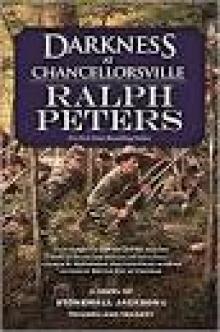 Darkness at Chancellorsville
Darkness at Chancellorsville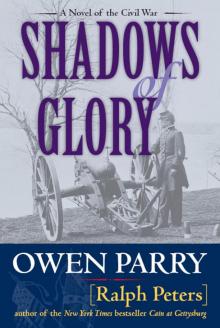 Shadows of Glory
Shadows of Glory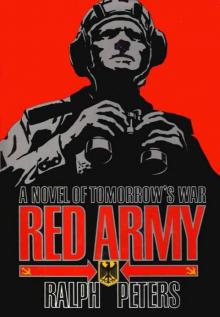 Red Army
Red Army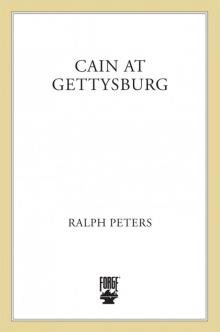 Cain at Gettysburg
Cain at Gettysburg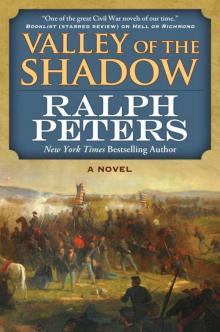 Valley of the Shadow: A Novel
Valley of the Shadow: A Novel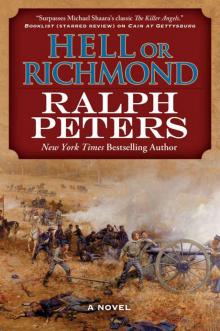 Hell or Richmond
Hell or Richmond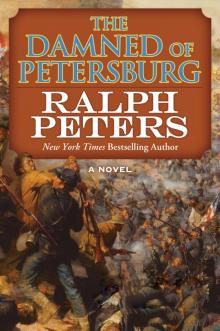 The Damned of Petersburg
The Damned of Petersburg The War After Armageddon
The War After Armageddon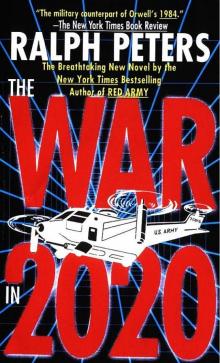 The War in 2020
The War in 2020